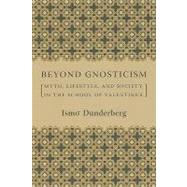
Note: Supplemental materials are not guaranteed with Rental or Used book purchases.
Purchase Benefits
Looking to rent a book? Rent Beyond Gnosticism : Myth, Lifestyle, and Society in the School of Valentinus [ISBN: 9780231141727] for the semester, quarter, and short term or search our site for other textbooks by Dunderberg, Ismo. Renting a textbook can save you up to 90% from the cost of buying.
| List of Tables | p. ix |
| Preface | p. xi |
| Acknowledgments | p. xiii |
| Introduction | p. 1 |
| The School of Valentinus After Gnosticism | p. 14 |
| Myth, Lifestyle, and the World in the Fragments of Valentinus | |
| Immortality as a Way of Life | p. 35 |
| Adam's Frank Speech | p. 46 |
| Cosmic Sympathy and the Origin of Evil | p. 60 |
| Valentinian Cosmogony, Lifestyle, and Other Christians | |
| Myth and Lifestyle for Beginners | p. 77 |
| Myth and the Therapy of Emotions | p. 95 |
| The Creator-God and the Cosmos | p. 119 |
| Walk Like a Valentinian | p. 134 |
| Two Classes of Christians in Practice | p. 147 |
| Myth, Society, and Non-Christians | |
| Myth, Power, and the Oppressed Church | p. 161 |
| Myth and Ethnic Boundaries | p. 174 |
| Conclusion | |
| Valentinian Secretiveness Reconsidered | p. 191 |
| Remarks on the Sources of Irenaeus's and Hippolytus's Accounts of Valentinian Theology | p. 197 |
| Abbreviations | p. 203 |
| Notes | p. 207 |
| Bibliography | p. 273 |
| Index of Modern Authors | p. 289 |
| Index of Ancient Sources | p. 295 |
| Index of Subjects | p. 303 |
| Table of Contents provided by Ingram. All Rights Reserved. |
The New copy of this book will include any supplemental materials advertised. Please check the title of the book to determine if it should include any access cards, study guides, lab manuals, CDs, etc.
The Used, Rental and eBook copies of this book are not guaranteed to include any supplemental materials. Typically, only the book itself is included. This is true even if the title states it includes any access cards, study guides, lab manuals, CDs, etc.